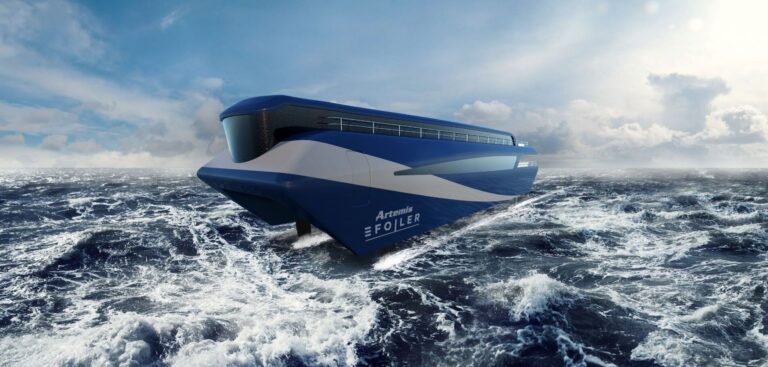Condor Ferries has joined the Belfast Maritime Consortium and is to begin operation of a zero-emission commuter ferry as part of a pilot scheme service between Belfast and Bangor, County Down, in Northern Ireland.
Scheduled to enter service in 2024, the vessel will be the most advanced zero-emission commuter ferry in the world, Condor Ferries says. The ferry will act as a pilot scheme for fast passenger ferries which are currently being developed by the consortium and its leader Artemis Technologies.
Powered by the Artemis eFoiler, the ferries will be capable of flying above the water, providing passengers with a comfortable ride due to the vessel’s minimal wake at high speeds. The design means the ferries will use up to 90% less energy compared to some traditional ferries.
The £60m (US$78m) project has also been awarded a £33m (US$43m) grant by UKRI’s flagship Strength in Places Fund.
“We are always looking to the future, and this includes exploring ways of reducing our carbon emissions,” commented John Napton, CEO, Condor Ferries. “As an experienced commercial ferry company, we are therefore happy to join the consortium and help to develop this concept into an operational mode of transport.”
The Belfast Maritime Consortium consists of 14 members, comprising Artemis Technologies, Ards and North Down Borough Council, Belfast City Council, Belfast Harbour, Belfast Met, Catalyst, Condor Ferries, Creative Composites, Invest Northern Ireland, Northern Ireland Advanced Composites Engineering, Power NI, Queen’s University Belfast, Spirit AeroSystems, and Ulster University.
“The announcement that Condor Ferries is joining us in the Belfast Maritime Consortium is a hugely significant endorsement of the work we are doing and marks another milestone on our journey towards leading the decarbonization of maritime,” said Dr Iain Percy OBE, CEO and founder, Artemis Technologies. “Belfast will get a glimpse of the future when the pilot service commences operation, but it is just the beginning. We are already receiving interest from around the globe as governments and cities across the world seek sustainable transport alternatives that balance the requirement for people to continue to move around with the need to reduce carbon emissions.”
The pilot service will serve a route between Bangor Marina and Belfast’s Titanic Quarter and is expected to complete each leg of the journey in approximately 30 minutes.
“The addition of Condor Ferries to the Belfast Maritime Consortium is hugely welcome and brings our city one step closer to realizing our net-zero ambitions,” explained John Walsh, chief executive, Belfast City Council. “Blue-green infrastructure will be a vital part of Belfast’s integrated transport plan and we look forward to seeing zero emission ferries on Belfast Lough, transporting people between the City and North Down.”



